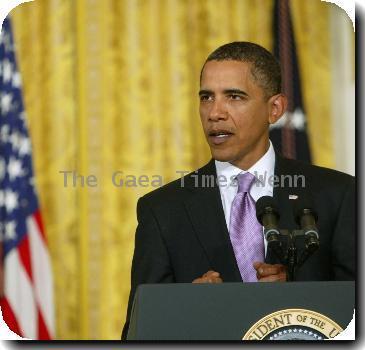BP shares bounce back, a day after hitting 13-year low, despite talk dividend may be suspended
By Robert Barr, APFriday, June 11, 2010
BP shares rebound despite dividend suspension talk
LONDON — Shares in BP PLC rose Friday despite suggestions by its chief executive that the company’s second quarter dividend may be suspended to calm political criticism in the United States over the massive Gulf of Mexico oil spill.
BP shares closed up 7.2 percent at 391.90 pence ($5.70) on the London Stock Exchange after touching a 13-year low on Thursday. In New York, BP shares were up 3.3 percent at $33.85 at midday.
BP shares have taken a huge hit, falling from 655.4 pence ($9.51) after the April 20 explosion on the Deepwater Horizon rig killed 11 people and triggered a spill that has sent millions of gallons of oil gushing into the Gulf’s fragile waters.
BP has come under heavy pressure from President Barack Obama and his administration to suspend its quarterly dividend, a possibility that initially soured investor sentiment but which some think is now priced into the share value.
“We are considering all options on the dividend. But no decision has been made,” BP’s Chief Executive Tony Hayward said in an interview in Friday’s Wall Street Journal.
Suspending the dividend would disappoint investors — including millions of British retirees whose pension funds include BP, which used to be the country’s largest company. But it could also deflect some of the intense political heat that BP is feeling in the United States.
To deflect a widening trans-Atlantic rift, Prime Minister David Cameron was to discuss the oil spill in a phone call with Obama on Saturday.
BP Chairman Carl-Henric Svanberg — who has faced criticism for not being more visible in BP’s response — met Friday with British Treasury chief George Osborne and spoke on the phone with Cameron.
Cameron’s office said the prime minister “was frustrated and concerned about the environmental damage caused by the leak but made clear his view that BP is an economically important company in the U.K., U.S. and other countries.”
“It is in everyone’s interests that BP continues to be a financially strong and stable company,” Cameron said, according to his office.
Osborne said the British government “understand(s) the concerns of the U.S. administration,” but added “the prime minister is also clear that we need constructive solutions and that we remember the economic value BP brings to people in Britain and America.”
Svanberg insisted that the company was doing all it could to stop the spill.
“We have done everything we can to try to fill the well and we have said we would do everything expected from us in cleaning up the beach, taking care of all the claims and learn from this incident and make deep sea drilling an even safer place,” Svanberg told broadcaster ITN after the Treasury meeting.
Thursday’s share turmoil came after U.S. Interior Secretary Ken Salazar said he would ask BP to compensate energy companies if they have to lay off workers or suffer economically because of a six-month moratorium on deep-water drilling imposed by the Obama administration following Deepwater rig explosion.
The chief executive of Britain’s National Association of Pension Funds said Friday that investors might be receptive to a suspension of the dividend to protect the company’s long-term future. Joanne Segars told the BBC that BP’s “long-term” future was far more important.
“BP’s current difficulties shouldn’t have an immediate or serious impact on those saving into a pension scheme or on those who have retired,” said Segars, the association’s leader.
James Bevan, chief investment officer at CCLA, which manages investments for charities and local governments, said BP could afford to suspend dividends.
“BP has always said that its dividend policy will take account of the strength of its balance sheet — BP’s balance sheet is very strong — but also the long-term growth prospects for the company,” Bevan said in a BBC radio interview.
“And deferring one or even two dividends would not be inconsistent with taking a long view that ultimately could repay shareholders handsomely.”
Some analysts are already predicting a cut in the dividend. Evolution Securities said it expected the current year payout to be 28 cents a share, half of the previous year’s level, but it continued to recommend BP shares as a “buy.”
The White House on Thursday released a letter inviting Svanberg and “any appropriate officials from BP” to meet next week with senior administration officials.
Coast Guard Adm. Thad Allen, who leads the U.S. government response to the crisis, said Obama would join part of that meeting. Obama has yet to meet with any BP official since the explosion.
White House Press Secretary Robert Gibbs did not rule out the possibility of a meeting next week between Obama and Hayward, who is to testify next Thursday at a House Energy subcommittee hearing into the spill.
Meanwhile, BP announced a $25 million grant to Florida to support the state’s contingency plan to deal with a leak from a BP well, and the same amount to help the state’s tourist industry.
Associated Press writer Jill Lawless also contributed to this story from London.
Tags: Barack Obama, Dividends, England, Europe, London, North America, Oil spill, United Kingdom, United States, Western Europe



